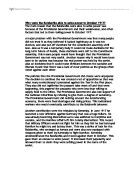In the period of February-October the provisional government had many complications that lowered their status among the Russian people, and left them in a venerable situation for the Bolsheviks to manipulate. The provisional government of Duma Deputies took over the government, after the Tsar's abdication, but soon the Petrograd Soviet made sure that they could not act without their support. The Soviet gave an instruction, named Order No. 1, which stated that soldiers and sailors were to obey their officers and the government only if their orders did not contradict the decrees of the Petrograd Soviet, thereby effectively limiting the provisional government Government's control over the armed forces. This eventually caused hostility between the two groups due to this multiparty ruling, the provisional government were being over-ruled and this left them in a very shaky position.
The provisional government made many mistakes such as failing to conclude the war. The Government failed to remove one of the greatest obstacles to peace: Russian participation in the First World War. The decision to continue with the war was to prove extremely unfortunate. It was unpopular, as there appeared to be few aims to the continued fighting. The government quickly lost the support of a large proportion of the troops. This provided excellent targets for Bolshevik propaganda. The Russian situation in the war worsened and humiliating defeat began to loom. This robbed the provisional government of any popular support, and the chance to crush army dissent.
In May, Kerensky was made war minister and inspired the country to support the Army in a fresh attack on the Austrians. However, this attack known as the 'June Offensive' was a failure, as a consequence, bread rations were reduced even more; rail workers went on strike as well as workers from Puetilov arms factory. Whole Russian regiments began to revolt. The government created hope among the people but there was a disastrous outcome. People started to question their judgment and turned their heads to the Bolsheviks. In the atmosphere created by the news of the failure of the offensive and the government's mounting problems, the protests of early July turned into a direct challenge to the provisional government. The provisional government blamed the small revolutionary parties and particularly the Bolsheviks for stirring unrest. The government ordered the arrest of leading Bolsheviks and those who were not captured were forced into hiding. As a result of the fears aroused by the July days the provisional government was reorganised under a new leader, Kerensky, many believed it to still be weak and growing even weaker.
Another challenge that the provisional government faced was the Kornilov affair. They were further weakened by the attempt to seize power, by General Kornilov. Kornilov believed the provisional government was not strong enough or determined to take the action that was needed to continue with the war or to crush the revolutionary parties. He attempted to seize power by ordering the army he commanded to march to Petrograd and take control of the city. This however failed. It did not failed because of the obstruction of the government, but because Kerensky asked the Bolsheviks to help him to defeat Kornilov. The Bolsheviks organized the railway workers to sabotage the troop trains and block the railway lines. The Bolsheviks infiltrated Kornilov's army and encouraged his troops to rebel. The Bolsheviks were able to claim that it was they, and not the provisional government, who had saved Petrograd from Kornilov. The Bolsheviks gained publicity and popularity as a result.
The Bolsheviks alternatively had many strengths to take advantage of during February to October. The Bolsheviks had many clear ideas and clever slogans. On his return to Petrograd, Lenin made a speech, which was then brought together into a document called the "April Thesis". Sections of this were used as slogans for the Bolsheviks. "Bread, Peace and Land" and "All power to the Soviets" made them very popular with the different classes. The catch phrase "Peace, Bread, Land" had become extremely popular with the peasantry. Lenin was able to appeal to the peasants promising land reform, an end to the war and an improvement in Russia's food supply. Lenin used propaganda to spread his slogans, such as his newspaper 'Pravda'. The Bolshevik's slogans and ideas appealed to many people as they were the first party to provide a solution to Russia predicaments, opposed to what the provisional government was offering. By June the Bolsheviks slogan "All power to the soviets" was eagerly taken up by tens of thousands of demonstrating workers. The Bolsheviks controlled the soviets and its military. This united leadership made the Bolsheviks stronger and more of a threat to the government. It was not that Lenin supported the soviets in their present arrangement, and he did loathe much of what they had done, but the soviets were a power base. They had become an essential part of the government. Lenin thought that the soviets offered his small Bolshevik Party the means by which they could obtain power.
Support for the peasants and workers’ soviets grew rapidly through 1917, especially after the defeat of Kornilov. In October Lenin persuaded the Petrograd soviet to take the decision to overthrow Kerensky’s government. In October 1917, the Bolsheviks staged their revolution efficiently and quickly under the organisation of Trotsky. Within two days Trotsky’s Red Guards had seized railway stations, telegraph offices and other target such as the Winter Palace. They captured the government buildings and the Winter Palace in Petrograd on 25th to 26th October 1917, and the provisional government was arrested. This was done with relative ease, as the Bolsheviks were able to do this over a short time period and there was no resistance created by the provisional government. Only five people were killed during these events, mostly shot by stray bullets. Mobs only entered, looted and vandalized the Winter palace after it ceased to defend itself.







